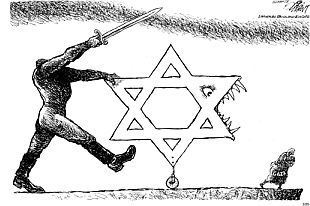 This year, a four-letter word dominated coverage of Israel on a near-daily basis.
This year, a four-letter word dominated coverage of Israel on a near-daily basis.
Gaza.
The war — which began at the end of December in response to increased Palestinian rocket fire — ended on the 20th day of the year.
The media war was dizzying. A prominent Greek weekly called Jews “Christ killers.” Hamas terror leaders got soapboxes in prominent US and British papers. BBC Arabic hosted a wonk who justified the death of Israeli kids. Canadian and Aussie reporters had close calls with Qassams; Israel restricted media access to Gaza in large part because of the Hamas “CNN strategy.” Al-Aqsa TV writers killed off Assud the Rabbit. And when Hamas fired a rocket from a foreign press building, an Al-Arabiya journalist’s delighted reaction was caught on camera for YouTube posterity.
Perhaps the most definitive example of the spin games Israel confronted in the mainstream media was from South African editor Mondli Makhanya and his pernicious portrayal of Israel:
Israel’s response to the “provocation” amounted to a steroid-pumped heavyweight boxer arriving to fight an anaemic midget armed with steel-lined boxing gloves.
All that was just January.
The rest of the year dealt with war crimes allegations, the Strip’s closure, Hamastan, Gilad Shalit, issues surrounding human rights organizations (most notably Human Rights Watch and its staffer Marc Garlasco), the Goldstone Report, and, last but not least, floundering Palestinian unity efforts which were impacted by the war.
 As the first anniversary of Operation Cast Lead approaches, Israel and the Palestinians continue fighting over the very facts of the war. Most news outlets report that more than 1,000 civilians died in the war, but Italian journalist Lorenzo Cremonesi was the first to indicate that the casualty count was far smaller than what Palestinian sources present. Later in the year, Simona Weinglass dug deeper, finding that Israelis and Palestinians even differ on the definition of a civilian casualty.
As the first anniversary of Operation Cast Lead approaches, Israel and the Palestinians continue fighting over the very facts of the war. Most news outlets report that more than 1,000 civilians died in the war, but Italian journalist Lorenzo Cremonesi was the first to indicate that the casualty count was far smaller than what Palestinian sources present. Later in the year, Simona Weinglass dug deeper, finding that Israelis and Palestinians even differ on the definition of a civilian casualty.
Lest we forget, there was more to Israel than Gaza. Israeli voters elected Benyamin Netanyahu to lead the country. Ben Gurion University Professor Neve Gordon’s call for a boycott of his own country sparked outrage among academics inside and outside of Israel. Neither was sports sacred: Al-Jazeera tried to bury Israeli soccer success.
Meanwhile, the financial pressures of the journalism industry continued hitting the foreign press corps. In April, McClatchy News correspondent Dion Nissenbaum poignantly noted how Beit Agron, which once bustled with foreign news bureaus, has become a ghost town. Now, in a sign of the times, Nissenbaum himself leaves for Afghanistan. Other reporters will cover Israel for McClatchy, but it will no longer maintain a full-time bureau.
Such is the state of journalism in microcosm.
Citizen journalism the idea that anyone capable of posting text, photos or video online is a news source emerged in 2009 as a force to be reckoned with. In Iran, ordinary people managed to supplant traditional journalism when the government banned press coverage of massive post-election protests. According to Mashable, in a 24-hour period, a staggering 3,000 videos were uploaded to YouTube and 2,250,000 blog posts were published just about the Iranian protests.
HonestReporting on Facebook stirred international controversy when we organized a special Facebook group calling on Facebook to allow Golan residents to identify themselves as Israeli. Facebook changed its settings, prompting a Syrian boycott. President Bashar Assad’s overreaction attracted welcome media interest in HonestReporting.
We thank our readers for sharing their feedback on the year’s worst Mideast coverage.
On with the “awards.”
Poison Pen Award: Pat Oliphant
For outright demonization of Israel, Pat Oliphant, one of the world’s most widely-syndicated cartoonists, wins hands down. The headless, jackbooted, goose-stepping figure holding an outstretched sword pushing a Star of David — baring its fangs at a Gaza mother and baby — appeals to the worst Nazi stereotypes.

My complaint was that Israel, the Israeli state, was behaving very much like their former tormentors were behaving back in the 30s and 40s, and insinuating that they were, they had a somewhat Nazi side to the way they were behaving. And I feel somebody should say it. And I did. And the s**t hit the fan. And I’m still hearing about it.
As Barry Rubin wrote in a widely quoted response to Oliphant:
This is, then, a loathsome cartoon. But to dismiss it by the single word “anti-Semitism” will foreclose thought as to why it is a loathsome cartoon. It will allow its defenders to avoid facing the real problems with this cartoon and the worldview it represents. And worst of all: that argument implies that the only problem was using the ambiguous Mogen David, that it would have been acceptable if he had just written the word “Israel” on the Nazi monster he created to represent the Jewish state.
Lousiest Journalist Wannabe: Ken Livingstone, The New Statesman
 During the year, a few papers began inviting various personalities to be guest editors, overseeing content for a day. This growing trend included comedian Stephen Colbert getting top job at Newsweek, and Ha’aretz letting prominent Israeli poets and writers run the paper. Guest editors are even a Christmas tradition at BBC Radio 4‘s flagship Today program.
During the year, a few papers began inviting various personalities to be guest editors, overseeing content for a day. This growing trend included comedian Stephen Colbert getting top job at Newsweek, and Ha’aretz letting prominent Israeli poets and writers run the paper. Guest editors are even a Christmas tradition at BBC Radio 4‘s flagship Today program.
The New Statesman jumped on the bandwagon by inviting ex-London mayor Ken Livingstone to be guest editor for the magazine’s Sept. 17 issue. Unfortunately, the edition included “Red Ken’s” fawning interview with Hamas boss Khaled Mashaal. An open-mic opportunity would be a more apt description: the Q&A’s length came in at exactly 4,000 words.
Livingstone’s entitled to talk to whomever he wants. Had he posted the interview on a blog of his own, nobody would have cared.
But The New Statesman is a mainstream magazine; it has a responsibility to publish news, not propaganda, irrespective of citizen journalists, celebrity editors, or media veterans. Too bad they didn’t solicit Colbert’s take on Hamas.
Most Insane Moral Equivalence: Max Blumenthal, Huffington Post
 Thanks to the power of bloggers and online video, Iranian protesters made Neda Soltan an international icon after a graphic video of her murder by government forces went viral on YouTube. Unfortunately, Huffington Post blogger Max Blumenthal drew a despicable moral equivalence between her killers and the Israeli army.
Thanks to the power of bloggers and online video, Iranian protesters made Neda Soltan an international icon after a graphic video of her murder by government forces went viral on YouTube. Unfortunately, Huffington Post blogger Max Blumenthal drew a despicable moral equivalence between her killers and the Israeli army.
As HonestReporting pointed out, there’s a big difference between Basij militiamen firing live ammunition at peaceful protesters and IDF soldiers using rubber-coated bullets and tear gas at weekly fence protests.
Blumenthal is the same person who filmed drunken Jewish students talking about President Obama on the eve of his widely anticipated Cairo speech. Huffington Post, to its credit, removed the video from the web site, saying it “had no news value.” (YouTube removed the video too.)
Worst Headline: The Evening Standard
Shortly before Israelis went to the polls in February to choose a Prime Minister, London’s Evening Standard featured a headline so outrageous that no further comment is necessary.

Biggest Train Wreck of Mishandled Sources: Ha’aretz
 In March, Ha’aretz broke a story of IDF soldiers’ testimonies exposing war crimes and human rights violations. For Israel’s critics, it was perfect: a sweeping indictment based on testimony from Israeli soldiers, first broken by a mainstream Israeli newspaper. The soldiers’ testimonies spread like wildfire around the world with sensational headlines:
In March, Ha’aretz broke a story of IDF soldiers’ testimonies exposing war crimes and human rights violations. For Israel’s critics, it was perfect: a sweeping indictment based on testimony from Israeli soldiers, first broken by a mainstream Israeli newspaper. The soldiers’ testimonies spread like wildfire around the world with sensational headlines:
Israeli soldiers admit shooting dead civilians during Gaza war
But when the news cycle ran its course, it emerged that Ha’aretz’s sources were based on nine soldiers describing incidents they heard about from others hearsay. The head of the military academy where the discussions took place, Col. Danny Zamir, slammed the media’s reaction to the affair. He wrote in the Jerusalem Post:
It was as if the media were altogether so eager to find reason to criticize the IDF that they pounced on one discussion by nine soldiers who met after returning from the battlefield to share their experiences and subjective feelings with each other, using that one episode to draw conclusions that felt more like an indictment.
And in a separate interview, Zamir singled out the NY Times:
Zamir said that what disturbed him the most was an article in The New York Times under the headline “A Religious War in Israel’s Army,” which left the impression that a veritable kulturkampf between religious and secular soldiers was under way.
Unfortunately, the hearsay element and Col. Zamir’s response didnt get equal billing to the sensational headlines Ha’aretz set in motion.
Biggest Train Wreck of Palestinian Sources: The Guardian
 Shortly after Haaretz’s bungled soldiers testimonies, The Guardian published a package of news, video, commentary and a staff editorial about Israeli war crimes in Gaza it claimed to have uncovered. The so-called expose suffered from three primary problems, which HonestReporting elaborated on.
Shortly after Haaretz’s bungled soldiers testimonies, The Guardian published a package of news, video, commentary and a staff editorial about Israeli war crimes in Gaza it claimed to have uncovered. The so-called expose suffered from three primary problems, which HonestReporting elaborated on.
-
The Guardian’s videos were presented as fact with out any supporting evidence.
-
The package lacked any verifiable information or any mention of the measures taken by the IDF to avoid civilian casualties while Hamas actively used human shields.
-
A reliance on dubious Palestinian sources. Palestinians aren’t brave enough — or stupid enough to risk the wrath of Hamas by telling journalists (or human rights personnel or UN officials) about the homes used as cover for rocket fire, the mosques used as weapons dumps, or the hospitals and ambulances commandeered by Hamas leaders.
Furthermore, the Jerusalem Post discovered that The Guardian crossed the line into outright activism with a letter to bloggers and web site owners appealing for them to plug the package in order to
. . . add weight to calls this week for a full inquiry into the events surrounding Operation Cast Lead, which was aimed at Hamas, but which left over 1400 Palestinians dead – around 300 known to be children.
Biggest Train Wreck of Anonymous Sources: NY Times
 When the White House sought to press Israel on settlements in June, anonymous “administration officials” told NY Times reporter Helene Cooper the US would take symbolic steps to show its protest.
When the White House sought to press Israel on settlements in June, anonymous “administration officials” told NY Times reporter Helene Cooper the US would take symbolic steps to show its protest.
It indicated a significant policy shift a real scoop for Cooper. But Cooper and the Times were used to simply convey a threat to Israel and raise the stakes of a policy disagreement. The anonymous officials, whoever they were, chose the right paper. The threats, appearing in a paper as prominent as the Gray Lady, could neither be overlooked nor ignored, and were perfectly deniable.
For several weeks, the tension between the two countries made headlines and raised Arab expectations until Washington backed down.
If nothing else, the fallout was instructive. The dustup reminded everyone that Israel indeed had an understanding with the US allowing for some settlement activity in already-existing communities, and that Israel was indeed honoring that understanding. Elliott Abrams, who was involved in US-Israeli settlement discussions, wrote:
For the past five years, Israel’s government has largely adhered to guidelines that were discussed with the United States but never formally adopted . . .
A look at an exchange of letters between President George Bush Jr. and Prime Minister Ariel Sharon shows that Israel might not have disengaged from Gaza without the understandings.
While the Obama administration ultimately took a hit, the NY Times was never called onto the
carpet over how the way it was used.
Worst Conspiracy Mongering: Channel 4 Dispatches
 In November, Channel 4’s flagship investigative TV show, Dispatches, aired a look “Inside Britain’s Israel Lobby.” Hosted by Peter Oborne (watch parts 1, 2, 3, 4 and 5) the show accused several UK-Jewish organizations of having divided loyalties to Israel, lacking transparency, and engaging in shady pressure tactics with the media, among other things.
In November, Channel 4’s flagship investigative TV show, Dispatches, aired a look “Inside Britain’s Israel Lobby.” Hosted by Peter Oborne (watch parts 1, 2, 3, 4 and 5) the show accused several UK-Jewish organizations of having divided loyalties to Israel, lacking transparency, and engaging in shady pressure tactics with the media, among other things.
No proof was ever offered that Jewish organizations lobbied the government or media differently than any other organized interest groups.
HonestReporting and managing editor Simon Plosker were targeted as well. Oborne’s investigation of HonestReporting was shoddy enough (details here, here and here) that it calls into question the rest of his investigation.
If nothing else, the broadcast boosted Plosker’s status in the Zionist media conspiracy.
Most Problematic Peer Review: British Medical Journal
 Medical journals in South Africa and Canada unfairly took Israel to task over Operation Cast Lead. But when the British Medical Journal went even further, claiming HonestReporting stifled debate, Dr. Simon Fishman took a closer look and found the BMJ’s interest in Israel, uh, disproportionate.
Medical journals in South Africa and Canada unfairly took Israel to task over Operation Cast Lead. But when the British Medical Journal went even further, claiming HonestReporting stifled debate, Dr. Simon Fishman took a closer look and found the BMJ’s interest in Israel, uh, disproportionate.
Does anyone remember when getting an article through the rigors of peer review to publishing in these medical journals was considered prestigious?
Most Senseless Talking Head: Michael White
 Michael White, an associate editor at The Guardian, was a guest on BBC Radio London’s Breakfast Show discussing an attack on Italian PM Sylvio Berlusconi when he made the following statement:
Michael White, an associate editor at The Guardian, was a guest on BBC Radio London’s Breakfast Show discussing an attack on Italian PM Sylvio Berlusconi when he made the following statement:
In Israel they murder each other a great deal. The Israeli Defense Forces murder people because they don’t like their political style and what they’ve got to say and it only means that people more extreme come in and take their place.
A sharp interviewer with a little chutzpah could’ve stopped White in his tracks and followed up on his silly accusation. But it didn’t occur to the Breakfast Show hosts to do that because White’s language is now mainstream in the UK media. But even more troubling is the ease of White’s lie coupled with his responsibilities as associate editor.
And how does The Guardian relate to this? Good question. The paper hasn’t yet responded to HonestReporting’s concerns or the hundreds of emails we were cc’d on.
Dumbest Question: Yasmin Alibhai-Brown, The Independent
During the war, Yasmin Alibhai-Brown asked:
How many Palestinian Anne Franks did the Israelis murder, maim or turn mad?
The comparison only works if The Independent’s columnist can prove Dutch Jews fired rockets at Germany for seven years . . .
Crummiest Quality Control: The Age
 First, The Age of Melbourne published a nasty commentary by columnist Michael Backman, titled, Israelis Are Living High On US Expense Account in the paper’s business section. The paper pulled the commentary and published an apology saying the column “was published in error.” Backman apologized to the Australian Jewish community too.
First, The Age of Melbourne published a nasty commentary by columnist Michael Backman, titled, Israelis Are Living High On US Expense Account in the paper’s business section. The paper pulled the commentary and published an apology saying the column “was published in error.” Backman apologized to the Australian Jewish community too.
How does a column that noxious get published in error? According to Crikey, both the editor of the paper and editor of the business section were on vacation, leaving behind sub-editors who had to handle a column that went beyond their expertise in business:
In this case, I hear that the subs on the business desk at The Age are still arguing that the Backman column was all right and the Age had no reason to apologise for running it.
And now for the winner . . .

Dishonest Reporter of the Year: Donald Bostrom, Aftonbladet
 Despite all the issues surrounding the Gaza war, the unfounded claims of war crimes, the UN censure, lawfare efforts, and the contentious casualty count, readers selected a Swedish journalist who had never previously been on HonestReporting’s radar. The article in question had absolutely nothing to do with the war, but the fallout it created was steady and ongoing albeit less dramatic.
Despite all the issues surrounding the Gaza war, the unfounded claims of war crimes, the UN censure, lawfare efforts, and the contentious casualty count, readers selected a Swedish journalist who had never previously been on HonestReporting’s radar. The article in question had absolutely nothing to do with the war, but the fallout it created was steady and ongoing albeit less dramatic.
So we weren’t surprised in the least to find that our winner, Aftonbladet’s Donald Bostrom, touched a nerve in readers in ways that few journalists ever do.
It began in August when Aftonbladet, one of Sweden’s largest dailies, published a double-page spread in its cultural section headlined: They Plunder the Organs of Our Sons. The story quoted Palestinian claims that Israeli soldiers seized young men from the West Bank and Gaza and later returned the bodies with missing organs. (Read the original article in Swedish here.) It stirred a hornet’s nest of issues:
1) Independent verification: Bostrom failed to independently verify the claims of the family of Bilal Ahmed Ghanem, who died in 1992. Bostrom later backtracked, saying:
I was [present] during the interview that night, I was a witness. It concerns me to the extent that I want it to be investigated . . . But whether it’s true or not – I have no idea, I have no clue.
Moreover, when Jerusalem Post reporter Khaled Abu Toameh tracked down the Ghanem family who said they never told Bostrom their son was missing organs:
The mother denied that she had told any foreign journalist that her son’s organs had been stolen.
However, she said that now she does not rule out the possibility that Israel was harvesting organs of Palestinians . . . .
Bottom line: Bostrom’s story is based on nothing more than unconfirmed testimonies, half-truths and speculation.
2) Using true facts to make a false conclusion: Bostrom “covered” Ghanem’s death in 1992, so why revisit the issue? Because he places it in the context of the New Jersey organ trafficking scandal, an international conspiracy is strongly implied but never proven.
 3) Burden of proof: Although the burden of proof for such a claim normally falls on the journalist, amazingly, Aftonbladet editor Jan Helin shifted it to Israel, when he told reporters:
3) Burden of proof: Although the burden of proof for such a claim normally falls on the journalist, amazingly, Aftonbladet editor Jan Helin shifted it to Israel, when he told reporters:
The article poses a question why has this body been autopsied when the cause of death is obvious? There I think Israeli authorities owe us an answer.
Not at all. It’s up to Bostrom to convince doctors like Mazen Arafah and Andrea Meyerhoff, who point out that it’s medically impossible to harvest organs from people who die of gunshots to the abdomen and chestas Bostrom described of Ghanem.
4) Is the article anti-Semitic? The question cuts to the core of the ensuing diplomatic crisis when the Swedish government refused to condemn the article. Swedish officials maintained it was an issue of free speech, while Israeli officials argued that irresponsible journalism that incites against Israel and Jews everywhere.
For the record, Israel didn’t ask Sweden to censor the article. For comparison, the UK government condemned the New Statesman for its interview with Khaled Mashaal.
5) News stories take on a life of their own: Since the article went to print, rumors of Israeli organ-harvesting surfaced in Ukrainian elections, were an excuse to ban Israeli doctors from an Egyptian medical conference, and brought at least one pseudo-journalist crawling out of the woodwork with copycat claims.
Moreover, as we prepared to publish these awards, Israel’s Channel 2 aired a video of top pathologist, Dr. Yehuda Hiss, admitting that his staff harvested organs from Israelis and Palestinians during the 1990s without families’ permission. The video offered no evidence that Palestinians were killed by the IDF (Israel’s Institute of Forensic Medicine in Abu Kabir is a civilian facility operated by the Ministry of Health.) Not letting facts get in the way of a sensational headline, a headline in Sydney’s Daily Telegraph stated:
Israeli Army Admits Stealing Organs
“This reprinting of old information must not be allowed to become the occasion for mischief, blasphemous lies or distortions,” Conference of Presidents of Major American Jewish Organizations Chairman Alan Solow and Executive Vice Chairman Malcolm Hoenlein said in a statement. Media interviews surrounding the reports “provided no evidence to indicate that any Pale
stinian was killed to ‘harvest organs.’ Such accusations can inflame the region, incite violence and undermine the chances of peace.”
As nasty as the story is, there is actually no linkage to Bostrom’s false allegations, which libeled the IDF. The Abu Kabir scandal did not target Palestinians. Israeli soldiers, civilians, Jews, non-Jews as well as Palestinians were the victims of a domestic scandal that was discovered and dealt with by the Israeli authorities to ensure that such ethical lapses would not be allowed to reoccur.
6) Bostrom’s flippant attitude towards the truth: While attending a November media conference in Israel, Bostrom told Ha’aretz’s Gideon Levy:
If I were writing it again, I would stress that the IDF liquidates so many youths without a trial and that they take bodies and conduct autopsies on them without the permission of the families. My article created confusion and was incorrectly interpreted.
Even more amazingly, he also told Israel Channel 2’s Yair Lapid:
In response, Bostrom said that he understands why people are angry, saying that everyone lies while at war. He said that it is difficult for reporters to distinguish between what is correct and what is a lie.
That’s Bostrom in his own words.
Donald Bostrom doesn’t know the truth because he failed to put in the necessary long-term investigative work real journalism demands. Nor does he show any concern for the consequences of his words. And for those reasons, HonestReporting readers chose him as the Dishonest Reporter of 2009.
* * *
We covered a lot of ground in 2009.
And with help from our readers, we’ll continue to monitor and hold the media to account in 2010.

